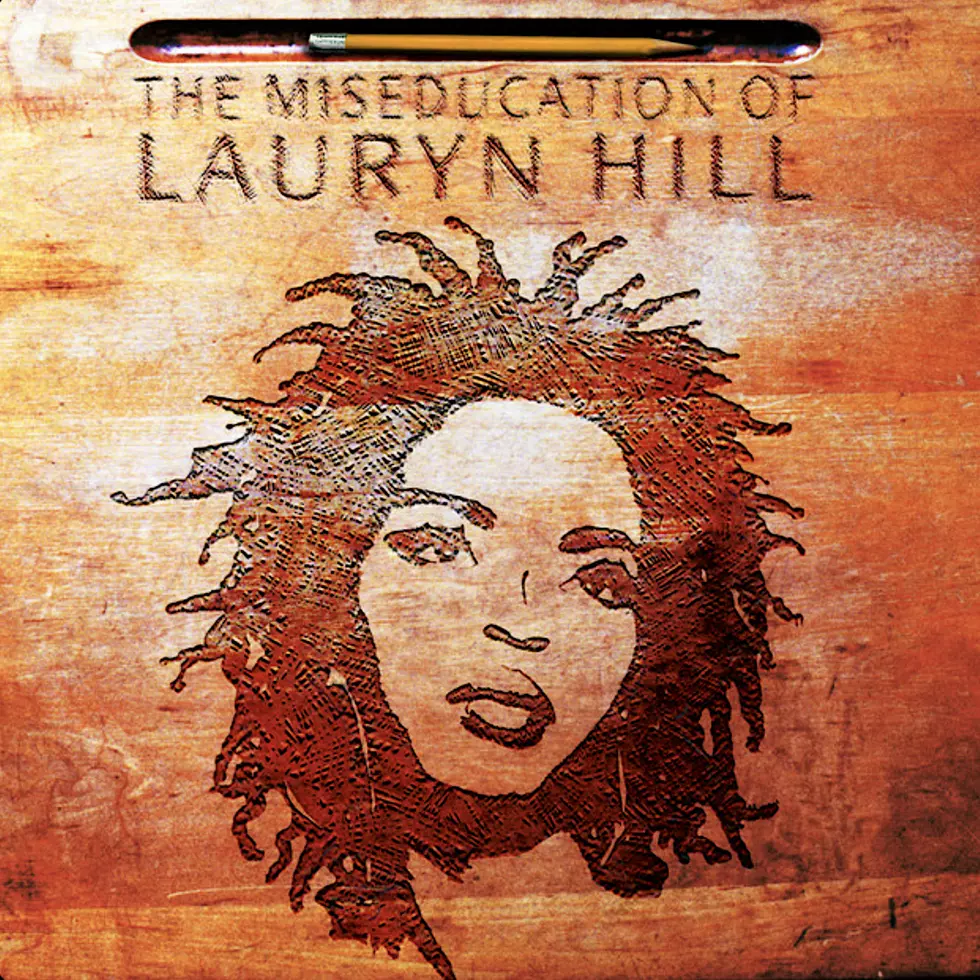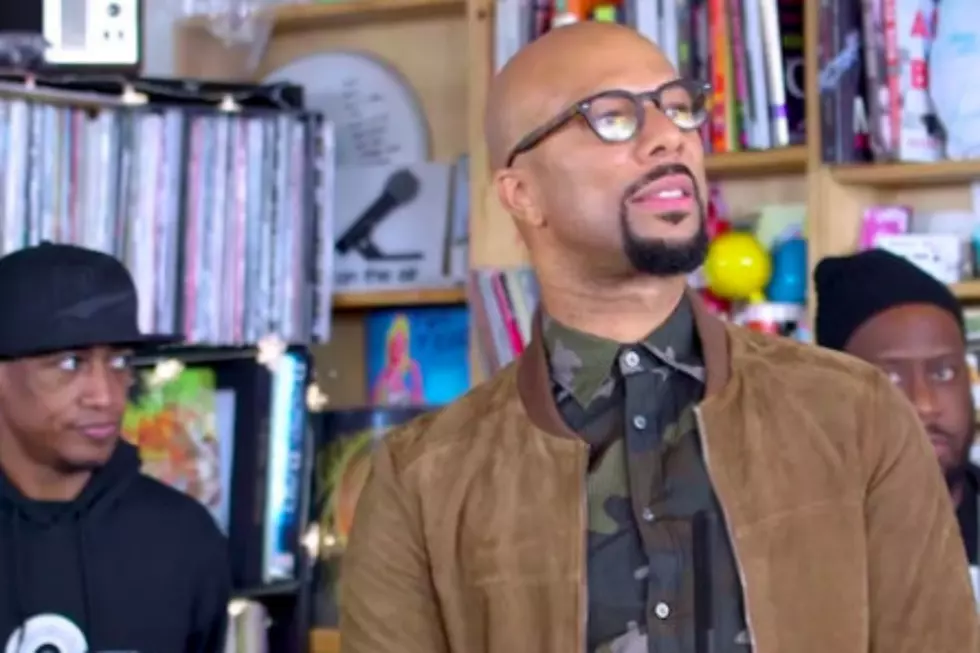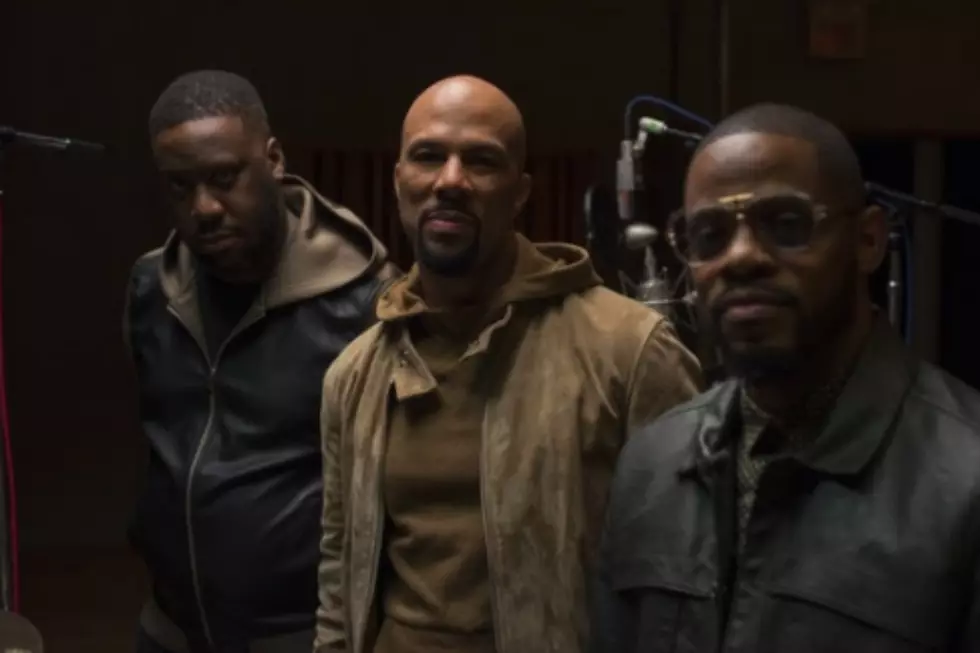
Robert Glasper Experiment, ‘Black Radio 2’ – Album Review
“Jazz needs a big-ass slap,” Robert Glasper once said, commenting on the genre's fall from relevancy. And it seems Glasper's mission with ‘Black Radio 2' was to provide all the slap jazz needed and then some.
'Black Radio' the Robert Glasper Experiment’s Grammy award-winning album, didn’t fall victim to a stubborn nostalgism nor did it go overboard with experimentation. Instead ‘Black Radio’ took neo-soul, hip-hop and R&B -- genres with essentially the same DNA as jazz -- and melded them into an easily accessible package for listeners.
‘Black Radio 2’ follows its successor’s blueprint for the most part, with the quartet laying the backdrop for a variety of guests. Featured performers include Lupe Fiasco (who also collaborated on the original ‘Black Radio’) Common, Jill Scott, Emeli Sande and the left-field choice of Snoop Dogg. The guests aren't the only aspect that’s switched up, though as ‘Black Radio 2’ incorporates more original compositions in the mix than its predecessor. Not simply a jazz cover band by any means the Robert Glasper Experiment usually make their covers their own anyway. What the new focus on original compositions means is that there’s less restriction, which many of the guest performers take full advantage of. Jill Scott did this in her performance on the lead single ‘Calls,’ where she effortlessly mixes purposeful singing with a breathy conversational style. Common also comes through with a self-assured and replayable verse on ‘I Stand Alone,’ while Marsha Ambrosius steals the show with transcendent vocals on the seven-minute 'Trust.'
Overall, ‘Black Radio 2’ is rather safe and, as is the case with albums featuring many guests, some performances fall flat -- Dwele and Emeli Sande are the examples here. The Robert Glasper Experiment -- which includes keyboardist/vocoderist Casey Benjamin, bassist Derrick Hodge and percussionist Mark Colenburg -- sound polished, but much of the band's performances don't feel as distinguishable as the first LP. It may take multiple listens for the casual listener to tell which track is which if judging strictly by instrumentals.
Despite its lack of color, 'Black Radio 2' does act as a decent follow-up for a band seeking to reconfigure jazz for today's context. The mission isn't completely accomplished, but at least the public knows Miles Davis isn't just for homework.
1. ‘Baby Tonight (Black Radio 2 Theme) / Mic Check 2’
Not the most nuanced piece of foreshadowing you’ll see on an album, the Robert Glasper Experiment reveals a majority of its surprises as the guest stars appear in the second part of the intro, ‘Mic Check.’ They’re each doing -- or pretending to do -- a mic check by doing their usual shtick, including Snoop Dogg freestyling with his unshakable cool, Common introducing himself in his unmistakable voice and Faith Hill showing of her vocals. The first part of the track shows there’s not going to be that much of a differentiation from the first installment of 'Black Radio.' Glasper’s lush piano and Benjamin’s cooing on the vocoder are still your hosts.
2. ‘I Stand Alone’ Feat. Common & Patrick Stump
The last time Common was working on a solo effort (2011’s ‘The Dreamer/The Believer’), he had the out of character beef with Drake hanging over him. To be fair, the battle did give us Drake’s excellent ‘Stay Schemin’ verse, but it was still a weird situation because this wasn’t the Common many fans were familiar with nor was he at his best. His best involves being a cool-headed source of empowerment or introspection (see: ‘Like Water for Chocolate’). ‘Black Radio 2’ gives him a lane to do that, and he showcases that here.
3. ‘Who We Are’ Feat. Brandy
This track is quite different from the world-conquering theme of ‘I Stand Alone,’ but it’s a good digression as the album settles into its groove here. A welcome Brandy delivers a strong vocal performance over Glasper’s comforting chords.
4. ‘Calls’ Feat. Jill Scott
As the LP's first single, ‘Calls’ is impressive because its showing of how group can create solid, original material. This song builds anticipation in a way that’s accessible and distinctive. The main power of ‘Calls’ comes from Mark Colenburg’s drums rather than the intertwining of the quartet’s performances. It’s a steady march that adds another layer of seriousness to Scott’s nicely sung thank you letter. It isn’t the obligatory thank you you’d half-heartedly say to someone who holds open doors. When she answers those calls, she really appreciates them.
5. ‘Worries’ Feat. Dwele
This transition in songs may be a bit more unintentional than the one between ‘I Stand Alone’ and ‘Who We Are.’ While ‘Calls’ benefits from Scott’s shot of personality, this one doesn’t stand out as its own track. Dwele’s vocals are so smooth, that they're too smooth and border on lethargic.
6. ’Trust’ Feat. Marsha Ambrosius
Colenburg’s noticeable percussion in ‘Calls’ shows up again here, but this time it symbolizes fragility instead of conviction. The drums act as the song's core heartbeat while Ambrosius delivers a stunning performance that justifies the song’s over seven minute time span. Glasper’s keys adds a sense of tenderness as well.
7. ‘Yet to Find’ Feat. Anthony Hamilton
The cymbals at the beginning of the track imply this is going to be the exhale after the emotional density of ‘Trust,’ but it’s not too long until we find out that’s not the case. Anthony Hamilton’s vocals are world-weary, but still impressive as he sings, “I’m slowly giving up inside / I feel like all this love has died / No matter how much I’ve tried, I’ve yet to find a new thing.” We were ready to take on the world on ‘I Stand Alone.’ What happened?
8. ‘You Own Me’ Feat. Faith Evans
The admission of love follows the lines of Jill Scott’s presence on ‘Calls.’ Faith Hill is accompanied by sunny synths as she sings, “'Cause everything that you do is amazing to me and I / Could never replace you baby even if I try.” Hill is good, but not great here on what turns out to be a decent song for cuffing season.
9. ‘Let It Ride’ Feat. Norah Jones
We’re finally picking up the tempo a little bit. A blistering, but steady drum pattern invites a soothing Norah Jones performance, which switches the focus from relationship introspection to something more adventurous and nonchalant (She’s letting it ride, you see). Glasper’s piano solo and Wayne Brady’s hilarious freestyle is something to listen out for as the track ends.
10. ‘Persevere’ Feat. Snoop Dogg, Lupe Fiasco & Luke James
Seeing Snoop Dogg listed as a guest performer is a welcome surprised, but will he add extra color to ‘Black Radio 2’ or blend in to the jazz surroundings? It turns out it’s the former and the results are good. He and Lupe Fiasco spit some poetry about life’s struggles while Luke James sings, “My heart will never change / I gotta persevere” on the hook. It’s a performance that’s good enough to inquire when James is releasing his album.
11. ’Somebody Else’ Feat. Emeli Sande
Faith Evans and Jill Scott are pretty happy with their significant others in their respective songs. That’s not the case for Emeli Sande. The Scottish artist sings about completely changing her identity, her surroundings and is “feeling like a big bad liar.” It’s decent, but it’s a bit of snoozer compared to the aforementioned two singers’ features.
12. ‘Jesus Children of America’ Feat. Lalah Hathaway & Malcolm-Jamal Warner
This reworked song is a bit of a puzzling one here. Its original inclusion on Stevie Wonder’s ‘Innervisions’ acted as a respite for an album partially surround by ugly themes like racism and drug use. The Robert Glasper Experiment does the track justice, and it includes a passionately told poem by Malcolm Jamal Warner about youthful strife, but it still feels a bit random though.
13. ‘Big Girl Body’ Feat. Eric Roberson
It’s been over a decade-and-a-half since Nas dropped ‘Black Girl Lost,’ and misguided young women are still all too common. So Eric Roberson decides to sing about it, but unfortunately his vocals feel underwhelming with their predictable composition. However, the saxophone breakdown during the latter half of the track is a pleasant surprise.
14. ‘You’re My Everything’ Feat. Billal & Jazmine Sullivan
Another one of the effort's relationship-oriented tracks, albeit this time it’s sung from both the male and female perspective. This is a cuffing anthem accompanied by twinkling keys from Glasper.
15. ‘I Don’t Even Care’ Feat. Macy Gray & Jean Grae
It’s not very often that you’re going to hear Macy Gray’s raspy vocals on the hook while Jean Grae nimbly goes through a few verses, so this collaboration is very welcomed. The zipping synth driving the chorus and the dense cymbals give Jean Grae a sense of direction.
16. ‘Lovely Day’
This Bill Withers cover feels a lot more fitting for the album than the inclusion of ‘Jesus Children of America’ -- it also loosely fits the project thematically as well. After touching on broken relationships and the hard knocks of life through some nocturnal production, the album ends with this floating cover, which doesn’t even sound of this era. Benjamin returns on the vocoder, and it’s peculiar he’d do so on such a sunny track. Glasper’s piano work and solid bass groove turn this from a potentially saccharine song to a refreshing one.
More From TheBoombox



![Watch Common, Robert Glasper & Karriem Riggins Perform ‘Black Kennedy’ on ‘Late Night With Seth Meyers’ [VIDEO]](http://townsquare.media/site/625/files/2018/05/common.jpg?w=980&q=75)

![August Greene Salutes Mississippi Activists, Culture in ‘Optimistic’ Video [WATCH]](http://townsquare.media/site/625/files/2018/02/August-Greene-Brandy-Optimistic-Video.jpg?w=980&q=75)

![Robert Glasper Releases Somber Track ‘The Cross’ Featuring Lianne La Havas and Common [LISTEN]](http://townsquare.media/site/625/files/2017/04/Robert-Glasper-The-Cross-Lianne-La-Havas-Common.jpg?w=980&q=75)

